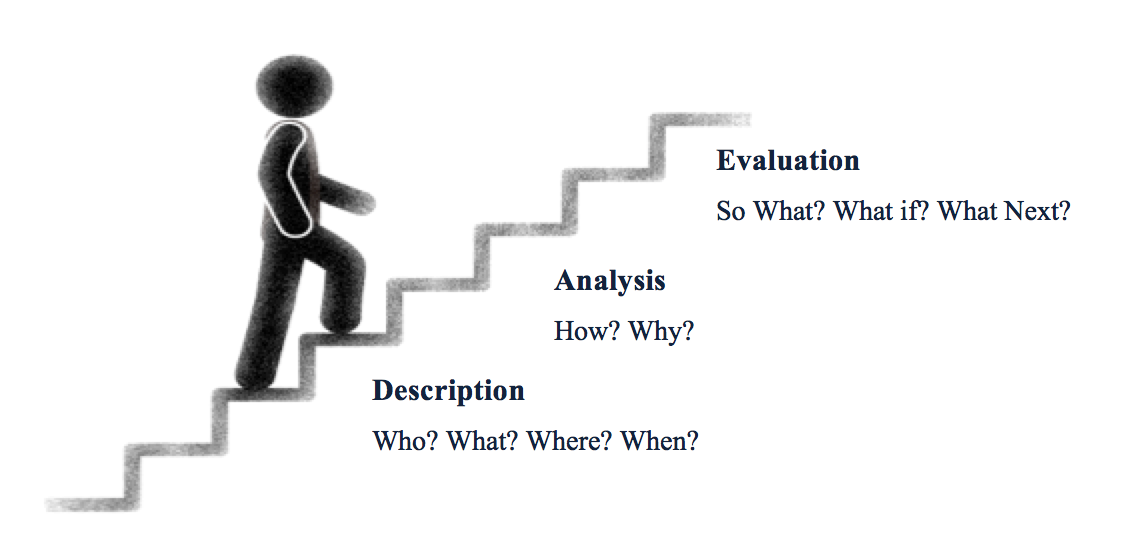What Is "Critical Analysis"?
"Critical analysis" is a desirable skill in all aspects of your university work, but what actually is it? As Brown and Keely discuss, analysing critically is a process of deconstructing what you read, write and listen to in a rational and logical manner (2012). It requires you to move beyond describing and analysing to evaluating, criticising and postulating on what you process.
However, while you are encouraged to critique, your response always has to be informed and well-grounded in research and wide reading. Critical analysis moves beyond simple description of a particular topic into the realms of analysis and evaluation, as visualised in the diagram below:

Image transcription
Description: Who? What? Where? When?
Analysis: How? Why?
Evaluation: So What? What If? What Next?
As shown in the diagram, description and simple analysis must precede evaluation, which is where critical analysis lies. With your evaluative skills you must be able to ask yourself what all the description and analysis actually means, what it says about the author or topic and what its implications are.
Critical analysis is associated with a "deep approach" to your learning, which means that you relate new knowledge to what you already know. It also requires the examination of theoretical concepts and ideas; comparing and contrasting issues and perspectives to challenge your own understandings and to speculate and seek out implications. Furthermore, you must be able to distinguish between what is evidence and what is an argument. This involves questioning assumptions, recognising generalisations, and identifying bias in what you see, read and hear. Thinking critically helps you to uncover links across large and diverse bodies of knowledge enabling you to synthesise your own informed ideas.
Why is it so important?
At university, it is essential to think critically as it allows you to understand and analyse the evidence, ideas and claims within your particular field of study. Critical analysis allows you to have greater clarity on the issues and information you process. Academic disciplines are kept alive through constant reflection, debate and refinement of ideas. Critical analysis is thus crucial to the survival and renewal of all fields of enquiry.
How do I start to think and analyse "critically"?
In an academic context, critical analysis requires you to do the following in all your endeavours:
- Provide informed reasoning backed by evidence and ideas from trustworthy academic resources such as books and peer-reviewed journal articles.
- Identify context, background and/or bias that may lead to distortion within what you read and hear.
- Identify and question unfounded assumptions.
- Explain the significance and consequences of particular data, arguments and conclusions made by others (Drew & Bingham 2001, pp. 281 - 282)
Questions to ask when critically analysing information
- What do I already know?
- What do I need to work out?
- Is this fact or opinion?
- What evidence do they use to back their claim?
- What are the stated and unstated assumptions in this information?
- Are there other ways we can think about this?
- Is it convincing and relevant?
Further resources
References
Browne, M & Keeley, S 2012, Asking the right questions: a guide to critical thinking, 10th edn, Prentice-Hall, Upper Saddle River, NJ.
Drew, S & Bingham, R 2001, The Student Skills Guide, 2nd edn, Gower, Aldershot, UK.